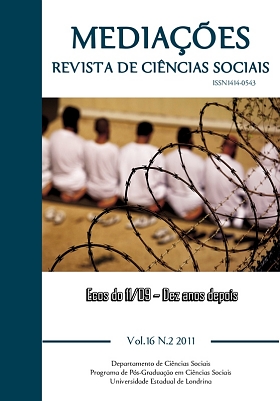Terror: um discurso após o 11 de setembro
DOI:
https://doi.org/10.5433/2176-6665.2011v16n2p15Palavras-chave:
Terror, Humanidades, Secularismo, Cultura, ReligiãoResumo
Este artigo é uma reflexão em busca de respostas diante das inquietações e da necessidade de explicar criticamente, por intermédio do conhecimento das humanidades, a guerra estadunidense contra o terrorismo. Apesar da impossibilidade de uma resposta à guerra, não podemos permanecer em silêncio. Assim, duas perguntas precisam ser formuladas: “Quais são algumas das respostas já existentes? E: como responder diante da impossibilidade de oferecer uma resposta?”. A resposta da autora é orientada pelo entendimento de que “a cultura é sua própria explicação” e, a partir daí, ela exercita um olhar de aproximação com o “outro”, para compreender tanto os “atentados suicidas” quanto a guerra contra o terrorismo. As reflexões da autora criticam as explicações estereotipadas formuladas pela direita e pela esquerda nos EUA. Questões de gênero, razão, religião e cultura permeiam sua análise que busca dar lugar às humanidades, às universidades e ao intelectual na tarefa de compreensão do “outro” para então ensaiar uma explicação sobre a guerra.Downloads
Referências
ARENDT, Hannah. Lectures on Kant’s political philosophy. Chicago: University of Chicago Press, 1990.
BENJAMIN, Walter. Critique of violence. In: BENJAMIN, Walter. Reflections: essays, aphorisms, autobiographical writing. Nova York: Schocken, 1978.
CASTLE, Terry. Courage, mon amie. London: Review of Books, 2002.
CHAUDHURI, Kirti N. Asia Before Europe: Economy and Civilization of the Indian Ocean from the Rise of Islam to 1750. Nova York: Cambridge University Press, 1990.
CHOMSKY, Noam. 9-11. Nova York: Seven Stories Press, 2001.
CHOMSKY, Noam. The theatre of good and evil.
CROSSETTE, Barbara. How to put a nation back together again. The New York Times, New York, Week in Review Section, 25 nov. 2001, p. 3.
DAVIS, Mike. Dead cities, and other tales. Nova York: New Press, 2002.
DERRIDA, Jacques. Différance. In: DERRIDA, Jacques. Margins of philosophy. Chicago: University of Chicago Press, 1982.
DERRIDA, Jacques. Faith and knowledge. In: ANIDJAR, Gil (ed.). Acts of religion. Nova York: Routledge, 2001. p. 42-101.
DERRIDA, Jacques. The University without condition. In: DERRIDA, Jacques. Without Alibi. Stanford: Stanford University Press, 2002.
DERRIDA, Jacques. Voyous. Paris: Galilée, 2003.
DEVI, Mahasweta. Douloti the bountiful. In: DEVI, Mahasweta. Imaginary maps. Nova York: Routledge, 1995.
EATON, Richard M. Temple desecration in pre-modern India. Frontline, India, v. 17, n. 25, p. 62-70, dez. 2000.
FLETCHER, George P. Romantics at war: glory and guilt in the age of terrorism. Princeton: Princeton University Press, 2002.
GRACE, Patricia. Baby no-eyes. Honolulu: University of Hawaii Press, 1998.
HARDT, Michael; NEGRI, Antonio. Empire. Cambridge: Harvard University Press, 2000.
HUNTINGTON, Samuel P. Clash of civilizations and the remaking of world order. Nova York: Touchstone, 1997.
KANT, Immanuel. What Is Enlightenment? In: SCHMIDT, James (ed.). What is enlightenment? eighteenth-century answers and twentieth-century questions. Berkeley: University of California Press, 1996a. p. 58-64.
KANT, Immanuel. Religion within the boundaries of mere reasonin. In: GUYER, Paul (ed.). Religion and rational theology. Cambridge: Cambridge University Press, 1996b.
KANT, Immanuel. Critique of pure reason. Cambridge: Cambridge University Press, 1998.
KANT, Immanuel. Critique of the power of judgement. Cambridge: Cambridge University Press, 2000.
LACAN, Jacques. The splendor of antigone. In: LACAN, Jacques. The ethics of psychoanalysis 1959-1960: seminar book VII. Nova York: Routledge, 1992.
LEWIS, Martin W.; WIGEN, Karen E. The myth of continents: a critique of metageography. Berkeley: University of California Press, 1997.
LIPTON, Eric; GLANZ, James. A nation challenged: relics; from the rubble, artifacts of anguish. New York Times, New York, seção 1, 27 jan. 2002.
MANDER, Harsh. Cry, the beloved country: reflections on the gujurat massacre, 2002.
MARWAT, Fazal-ur-Rahim. The evolution and growth of communism in Afghanistan (1917-1979): an appraisal. Karachi: Royal Book, 1997.
MASSELL, Gregory J. The surrogate proletariat: moslem women and revolutionary strategies in soviet central Asia, 1919-1929. Princeton: Princeton University Press, 1974.
MUJTABA ALI, Syed. Works. Kolkata: Mitra and Ghosh Publishers, 1974. v. 7.
OSORIO, Jon Kamakawiwo‘ole. Dismembering Lahui: the history of the hawaiian nation until 1887. Honolulu: University of Hawaii Press, 2002.
PRASHAD, Vijay. War against the planet: the fifth afghan war, imperialism, and other assorted fundamentalisms. Nova Délhi: LeftWord, 2002.
SAID, Edward W. Secular criticism. In: SAID, Edward W. The world, the text, and the critic. Cambridge: Harvard University Press, 1983. p. 1-30.
SAID, Edward W. Gods that always fail. In: SAID, Edward W. Representations of the intelectual. Nova York: Columbia University Press, 1994.
SHELLEY, Percy Bysshe. The defense of poetry. In: McELDERRY, Bruce R. (ed.). Shelley’s critical prose. Lincoln: University of Nebraska Press, 1967.
SLAUGHTER, Anne-Marie. Tougher than terror. The American Prospect, Estados Unidos, 28 jan. 2002.
SPIVAK, Gayatri Chakravorty. Can the Subaltern Speak? In: NELSON, Cary; GROSSBERG, Larry (ed.). Marxism and the interpretation of culture. Urbana: University of Illinois Press, 1988. p. 271-313.
SPIVAK, Gayatri Chakravorty. A critique of postcolonial reason: toward a history of the vanishing present. Cambridge: Harvard University Press, n. 32, p. 26-29, 1999.
SPIVAK, Gayatri Chakravorty. What is enlightenment? Gayatri Chakravorty Spivak conversing with Jane Gallop. In: GALLOP, Jane (ed.). Polemic: critical or uncritical. Nova York: Routledge, 2004. p. 179-200.
SPIVAK, Gayatri Chakravorty. Other Asias. Oxford: Blackwell, 2008.
STOCKHAUSEN, Karlheinz. Attacks called great art. The New York Times, New York, 19 sep. 2001. p. 3.
WORLD BANK. Creating cities that work in the new global economy. Research Bulletin, v. 10, n. 4, oct./dec. 1999. p. 1.
Downloads
Publicado
Como Citar
Edição
Seção
Licença
Os direitos autorais relativos aos artigos publicados em Mediações são do(a)s autore(a)s; solicita-se aos(às) autore(a)s, em caso de republicação parcial ou total da primeira publicação, a indicação da publicação original no periódico.
Mediações utiliza a licença Creative Commons Attribution 4.0 International, que prevê Acesso Aberto, facultando a qualquer usuário(a) a leitura, o download, a cópia e a disseminação de seu conteúdo, desde que adequadamente referenciado.
As opiniões emitidas pelo(a)s autore(a)s dos artigos são de sua exclusiva responsabilidade.




































